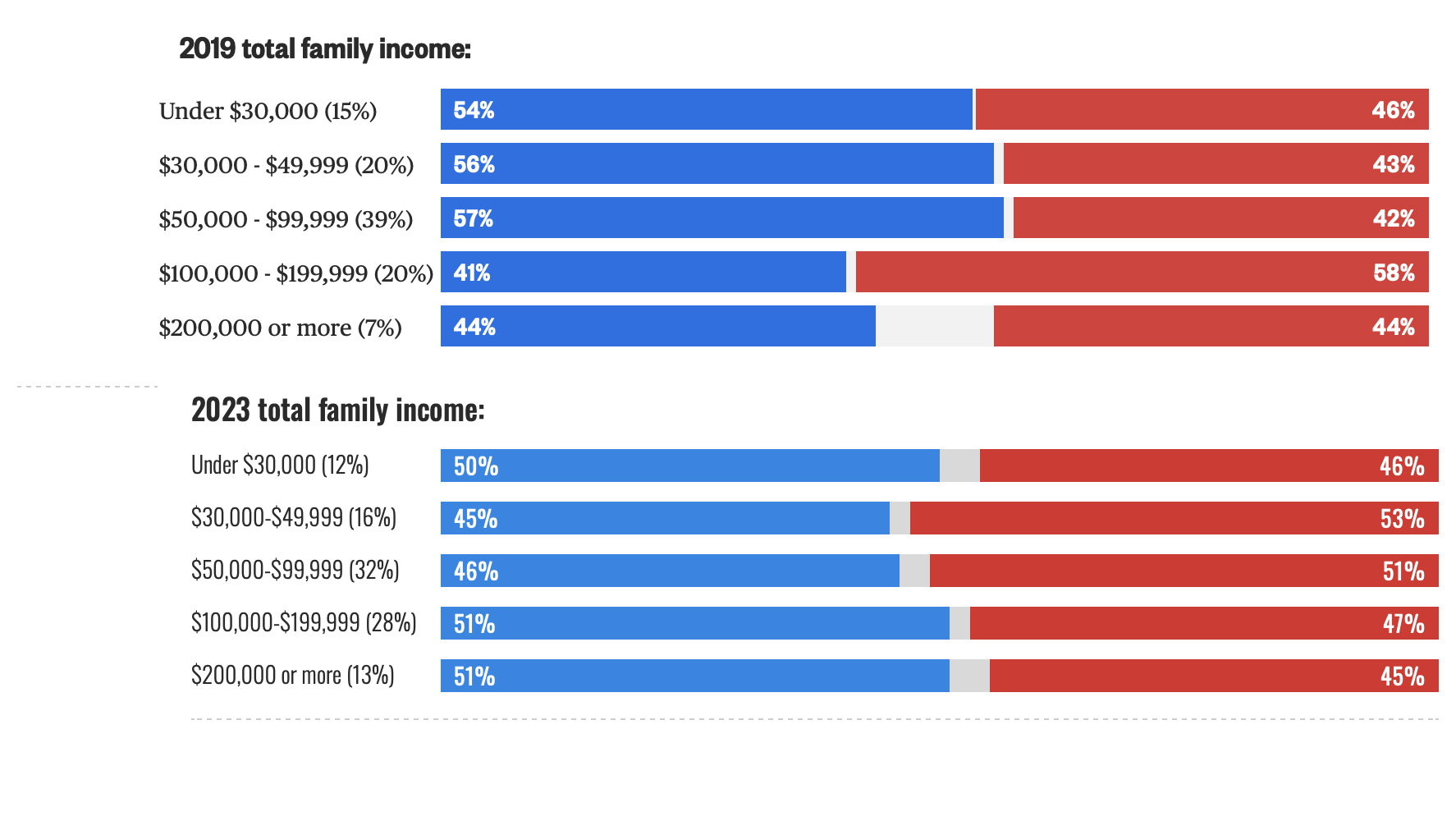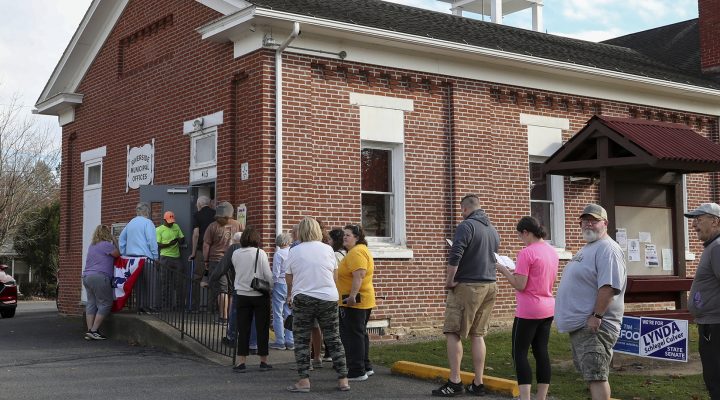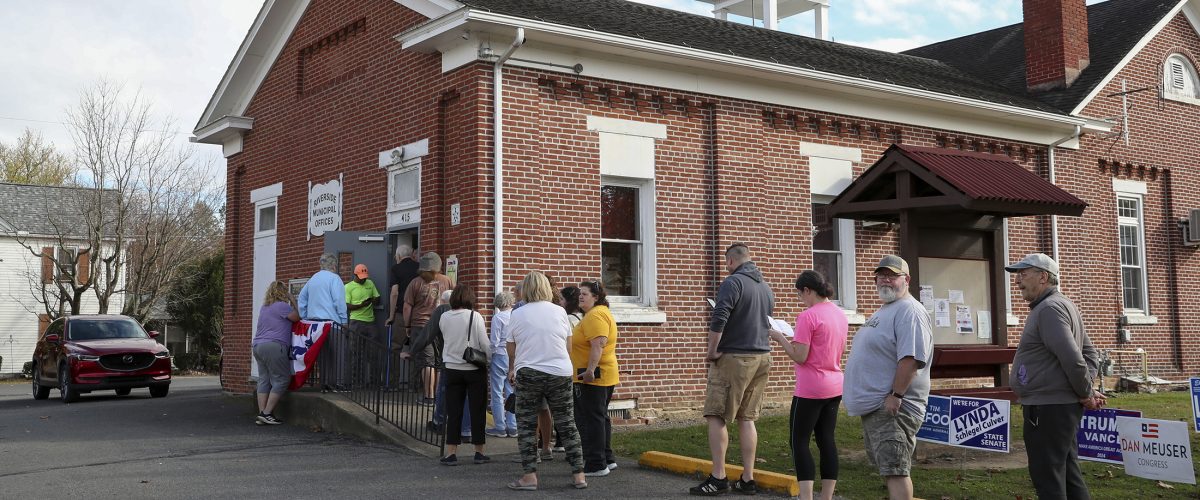“Madame Vice President, I’m speaking.”
This was the stunning message the majority of the American electorate sent Kamala Harris and her Democratic coalition in unmistakably clear terms this week.
As other commentators have noted, Donald Trump’s victory in this year’s general election is historic in that he is the first nonincumbent Republican to win the popular vote since George H.W. Bush. DNC operatives have responded to this scandalous blowout with shock, dismay and anger.
And the great scandal of it all? Their misery was avoidable had they only listened to the words of the working class, disaffected Republicans, never-Trumpers, independents and moderates.
A preface
Before I detail Harris’ failure, a preface.
I was raised by two conservative parents in the safe suburbs of Arlington, Texas. My upbringing was deeply rooted in the Baptist faith, and as an adult, I was received into the Anglican Communion via episcopal confirmation. My political journey, however, has been firmly aligned with the Southern Baptist Convention and the Grand Old Party.

Joseph Bumgardner (Sept. 6, 1797 – Jun. 23, 1892), the fourth great-grandfather of the author David Bumgardner.
My commitment to the Republican Party runs deep. It is not just a political affiliation, but a part of my heritage. My political lineage can be traced back to my fourth great-grandfather, Joseph Bumgardner, who served as an oversight officer for the Union in the Shenandoah Valley of Virginia during Reconstruction. I am not just any Republican; I am a seventh-generation Republican.
My love for the largest democratic political party on the planet is literally in my blood. Because of my great love for my party, I publicly endorsed Joe Biden in 2020 as a young, baby-faced and newly licensed minister — a decision that later drew my regret, saw my imprimatur revoked, and placed me into a national media spotlight.
“I am not just any Republican; I am a seventh-generation Republican.”
This was, arguably, what also precipitated my rise among the moderate faction of the Southern Baptist Convention and led to Mark Wingfield graciously extending me a fellowship in the spring of 2022, my senior year at Texas Baptist College. I also would be warmly accepted into and commissioned by the Black church when I was a bruised reed.
To be clear, I did not endorse President Biden to make anyone happy or receive validation from those progressives with whom I knew I would disagree on abortion (I’m opposed to it as a means of birth control but also recognize tragic conflicts of life), sexual ethics (I hold a traditional view of marriage even though I have been predominantly same-sex attracted in orientation all my life), the federal deficit (I want fewer entitlements and reigning in of spending, pretty please) and foreign policy (Israel is the United States’ single strongest ally).
No, I endorsed Joe Biden because I believed (and still believe), as so many others have said, that Donald Trump is deeply unstable.
I was not alone. Millions of voters rejected a second term for Trump in 2020 for his petulance, Twitter tantrums and the chaos that resulted from his mismanagement of the pandemic. This ultimately led to his loss, his denial of it and a criminal conspiracy to invalidate it on January 6.
Hi, I’m Homophobic; what’s your name?
I called it like I saw it, as did millions of other Americans. We were right to kick Trump out of the White House in 2020. We were vindicated when his former vice president came dangerously close to being murdered.
What made me unique, however, was my position as a Republican and theological evangelical.
Thus, I was one of the “good guys” among my progressive friends.
Until I wasn’t. Until we weren’t.
“I was one of the ‘good guys’ among my progressive friends. Until I wasn’t.”
By “we,” I mean the majority of the American electorate, with whom I identify despite voting for Nikki Haley in the last primary and opposing Trump this election cycle.
What began as hopeful promises for a transition during a time of immense suffering and unity amid deep division turned into disappointment. The anticipated transition morphed into contempt, further polarization and name-calling from unfortunate gaffes.
We were speaking, and yet no one was listening.
We said Joe Biden was a good and decent man of faith. But when we spoke out with concerns over what was arguably the biggest foreign policy failure since the Jimmy Carter era, our bona fides were questioned.
We expressed reticence over questionable and worrisome practices with little long-term substantializing data in treating teens, tweens and even children who suffer from the deep and debilitating pain of gender dysphoria and bullying for their sexual orientation. We were called bigoted and “ignorant.”
We (and especially the poor among us) cried out for help amid soaring inflation rates, which have not been seen since the Carter administration (historians and election scholars will one day write a book paralleling their similar policy failures). But we were told, “No, the economy is glorious,” and “You’re not looking at the actual numbers. Maybe your hat’s too tight.”
All this reminds me of my short and regrettable stint at Duke Divinity School, long a bastion of the progressive status quo and liberating sexual orthodoxies.
My first day serving as a member of its student council after having been graciously elected by my colleagues and peers saw me greeted by a member of Divinity Pride with, “It’s nice to meet you finally, David. I just kind of assumed you were sexist and homophobic” before I could even say “Hello” (and never minding the fact that I am a Side-B Christian who affirms the image of God in and inherent worth of LGBTQ people).
“There was grace and mercy for everyone else’s sins but judgment and ostracism for mine.”
It did not help that this ostracism from my peers was coupled with an excruciating breakup with the woman I loved and a crisis back home in Texas that saw my family wholly cleaned out of their savings because of the ever-rising tide of scams.
No, my suffering did not count because I was one of “those people.” I was a resident of an overwhelmingly red county from a red state. I was one of those despicable evangelicals. If my theology (nay, my very existence) didn’t send me to hell for being a fag, it was leading people to kill themselves. There wasn’t any in-between. There was grace and mercy for everyone else’s sins but judgment and ostracism for mine.
When others cried for help, they were heeded. When I cried for help, my suffering was too much and a burden to the community. Things came to a head when I attempted to take my own life, forcing my withdrawal. And when I lamented and cried, I was accused of grievance peddling. Sound familiar?

Exit polling data from the presidential election as reported by NBC News, 2020 and 2024. Blue indicates the Democratic candidate and red indicates the Republican candidate.
The preferential option and progressive hypocrisy
A key concept in Christian social teaching drawn from liberation theology is the “preferential option for the poor.” This doctrine teaches that the tangible alleviation of suffering (often fed by social and economic concerns) and the physical welfare of vulnerable people is central to the church’s worship and witness. Opposing existing paradigms and systems of oppression become central to gospel proclamation (and, in some traditions, outright replaces gospel proclamation).
In this scheme, the “preferential option” means God is on the side of the poor and suffering by divine default. God picks the suffering and disenfranchised over the privileged every time.
The late theologian and Peruvian Catholic priest Gustavo Gutiérrez Merino famously expressed this principle within the system of Christian theology, although historians note the term first appeared in the writings of the Latin American Episcopal Conference in Brazil in the “Puebla Document.”
“He gained 10 points among those with household incomes between $30,000 and $50,000.”
The principle is also drawn from the Hebrew Bible and a long line of liberation theology in Judaism. God saves the enslaved Israelites from the oppressive Egyptians. The prophets are replete with imagery of Yahweh as the God-Warrior who fights for the oppressed. Indeed, God is described as the avenger of the poor.
Given this undeniable biblical and theological reality, it must be noted that 45% of “the poor” (with household incomes less than $30,000) who await good news and with whom God automatically sides voted for Trump this year. And 53% of those with household incomes between $30,000 and $50,000 voted for Trump this year.
What’s most stunning is that while Trump’s support among the very lowest income bracket stayed the same this year compared to 2020, he gained 10 points among those with household incomes between $30,000 and $50,000 and he gained 9 points among those with household incomes between $50,000 and $100,000.
Thus, all the hand-wringing and pearl-clutching among progressive people of faith that Trump was only supported by these types of people not despite Trump’s apparent deficiencies but because of them (and, of course, these peoples’ prejudices, too) are willfully blind to the truth: You did not care for the poor.
You were content to preach tolerance and empathy while tut-tutting those silly rural and blue-collar workers (who are probably racist anyway) while you ignored the cry of those in need. You read Christian Century articles and attended webinars on the dangers of Christian nationalism while we asked for some spare change. Yes, you were kind enough to tell us you were on our side because that was the Christian thing to do but you didn’t give us any money. Therefore, as is often God’s habit, your God and our God subverted your expectations and cast down the mighty from their political thrones.
Yes, Madame Vice President, I am indeed speaking.
And my voice has reached the Almighty as it cries out against you.

David Bumgardner
David Bumgardner is a graduate of Southwestern Seminary’s Texas Baptist College and is a former BNG Clemons Fellow. He lives in North Texas and is a graduate theology student at Winebrenner Theological Seminary of the University of Findlay, Ohio. He plans to begin part-time postgraduate theological study in the United Kingdom next year.
Related articles:
Blinded by their hatred of Biden, Arab voters cut off their noses to spite their faces | Analylsis by David Bumgardner
Vote for us, because in the economy of God, there is no them | Opinion by Michael Friday
Poor People’s Campaign marches on Texas Capitol with demands for voting rights


